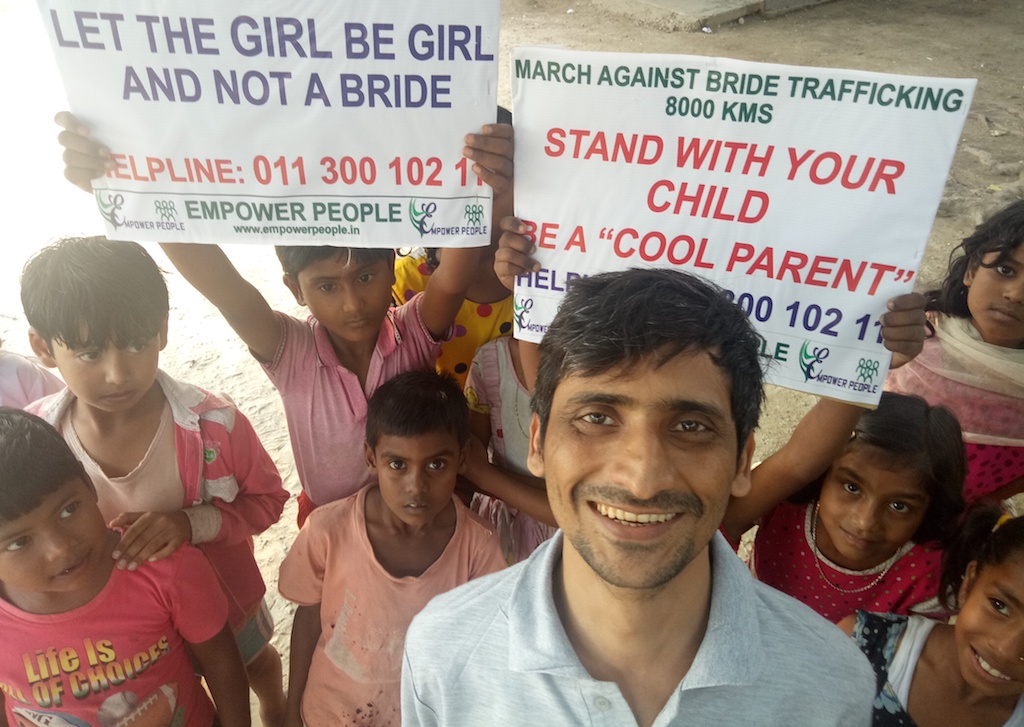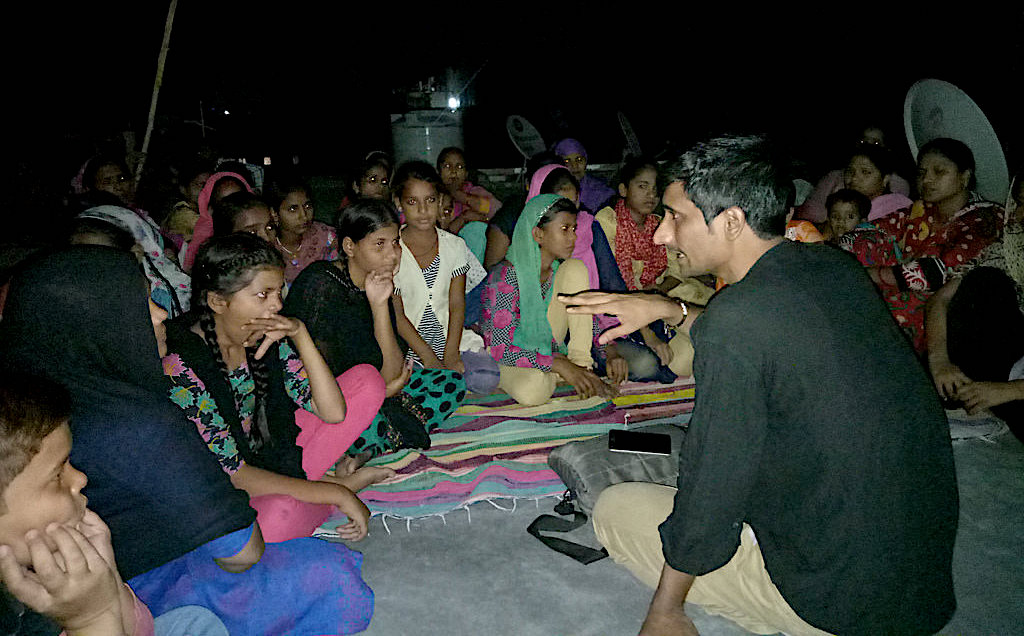BeyondHeadlines News Desk
New Delhi: Shafiq ur Rahman Khan has been chosen as the winner of the coveted “Grinnell prize” for the year 2019. Notably, he is also the first Indian to receive this award in recognition of his exemplary dedication in working to safeguard the rights of vulnerable women and children.
The Grinnell College Innovator for Social Justice Prize (the Grinnell Prize) honours individuals who have demonstrated innovative leadership in their respective fields and who show creativity, commitment and extraordinary accomplishment in effecting positive social change.
Shafiq R Khan has been honoured with the Grinnell prize for his outstanding contribution in working to eradicate the Indian bride trafficking trade (the selling of women into often multiple forced marriages) and further empowering the agency and leadership of survivors. He has risen above the norm and worked single-mindedly for the cause of rescuing girls who fall victim to “bride trafficking.” His humility and passion for social welfare is worth the commendation from the Global community.
Shafiq R Khan, 35 years, hails from Gaya, Bihar. His foray in activism began at a tender age of 15 when he joined a communist party with the hope of working for the well-being of the poor. He witnessed the sorrowful plight of people entrenched in poverty and bonded labour, and the power equations that worked to ensure the divide between the rich and poor remained wide and after around four years of work, he moved away from the party because he felt called to do more and do it differently.
In 2004, he moved to Delhi to explore different ways of tackling oppression and to understand the various dynamics more keenly. He joined the Bonded labour liberation front which was at the time working against sex-selective abortions where he became part of the back office team for ‘Multipath march against Female foeticide’. Shafiq especially noted the power dynamics with regard to gender and realised how a lot of the entrenched ‘societal values’ were actually ‘enemies of women.’
He began to study the movement of feminism which helped him understand the systemic nature of women’s oppression and thus the importance of land rights for women. He took up Bachelor of Social Work (BSW) for graduation in 2006 and it was during these days, that an event set him off on his unique path that he continues to walk 13 years on, even today.
Shafiq organised a 300 km long March against Female Foeticide in 2006 with a group of friends as part of a social mobilization campaign, where he met a trafficked bride who talked about her helpless plight and asked for his help. Due to the insistence of his co-travellers to focus on the March, he continued onward unable to do much at the time. Her story and plea though remained with Shafiq and he returned a month later only to find that she had been sold off and moved forward to another man. Upon further enquiry, no trace of the woman was found. She had disappeared. It came about as a shock for him to discover how men were uninhibitedly dealing in the sale and purchase of women in broad daylight and disposing of them once their needs were met.
Seeing someone suffer at the hands of others, seeing girl children being killed in the womb, seeing girls getting sold for less than a hundred bucks and living the life of slaves—all of these instances were a good enough reason for him to sharpen his focus on the issue of human trafficking and gender inequality. This incident served as a turning point in Shafiq’s life and he returned to Delhi with a decision to do something about it. He began chalking out a plan for bringing about a much-needed change while he continued advocating for the rights of women and applied for a fellowship to further his work. Notably, he became the first male fellow of Jagori, a prominent feminist organization in Delhi.
Shafiq founded an organisation by the name of ‘EMPOWER PEOPLE’ in 2006 with an initial aim to provide alternatives to women trafficked in the name of marriage. The organisation soon began working also on the factors contributing to Bride trafficking.
While Empower People began with the support of its founding members, it began generating funds from various individuals as well as community-based organizations. This phenomenon served to shape the organisation’s unique multi-pronged approach which involved spreading awareness among people about the menace of bride trafficking and the different ways they could engage with the work thus leading them to eventually become lifelong supporters of the cause.
EMPOWER PEOPLE is based out of New Delhi, India and operates in many regions across North and East India, most notably in Haryana and Assam. Today, the organization works to support law enforcement agencies and families of trafficked brides by locating and rescuing missing girls and women. The organization carries out due follow-up through an intensive rehabilitation and tracking process that aims to ensure that the women and their ostracized children live safer, more equitable lives and do not fall prey to trafficking again.
It may happen at times that the survivors do not wish to be repatriated to their families. Some women prefer to remain where they were brought to, and for such families, EMPOWER PEOPLE develops local communities of support and solidarity among trafficked brides. Led by the trafficked women themselves and supported by EMPOWER PEOPLE, these “communes” provide trafficked brides and their children with the education, resources and the skills they need to gain independence, to access justice, to avoid future trafficking, and to encourage men to accept new ideas about equality and ways of behaving.
In addition to being CEO of EMPOWER PEOPLE, Shafiq also works to recruit male allies to the causes the organization promotes. Shafiq acknowledges that being a male places him in a privileged position to challenge patriarchy. He works to convince men of the importance of granting women power and agency and in order to change minds, behaviours and systems of oppression, Shafiq regularly organizes informal discussions with groups of village men and religious leaders to talk about issues of justice, gender equality, education, land rights, domestic violence, honour crimes, issues related to dowry, “share of daughters” in inheritance, and rights of women in general.
Shafiq with his inspiring personality stands by his concept of making people the real instrument of change through awareness and participation. He believes in developing a holistic understanding of issues related to Violence against Women and addressing the problem at its root instead of working in project-wise schemes with a limited focus. He plans to have a mass movement and an ideological campaign within the society against female foeticide and gender-based exploitation.
He organizes Marches against Bride Trafficking for awareness generation and sensitization which serve as a platform for people’s participation and as an interface between the Government/NGO/NPO officials and vulnerable communities. In 2012, he carried out a 4400 km long March covering 2 Indian States while in 2018, he carried out a 14000 km long March covering 10 Indian States- an ambitious achievement to connect various dots across the breadth of the country and to gain an understanding of cross-State ground realities. He plans to conduct more Marches across the length of the country as well. His consistent curiosity to know the pulse on the ground and his willingness to modify and strengthen his approach based on new information gathered makes him a true innovator and a change-maker to watch out for and reckon with.
The Trustees of Grinnell College have recognised Shafiq to be thoroughly deserving of the honour of being a recipient of the Grinnell College Innovator for Social Justice Prize (the Grinnell Prize) for the year for his incredibly worthy work of about 20 years. The honour will include conferring of a prize amount of $50,000 for the organisation and $50,000 for his personal use. The Grinnell Prize ceremony is scheduled to be conducted in the first week of October and will be accompanied by a series of workshops conducted by Shafiq R Khan in collaboration with the University.










